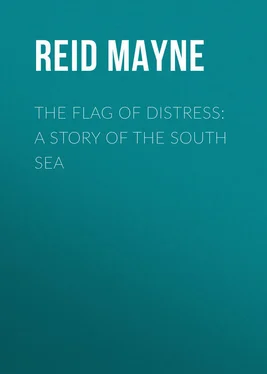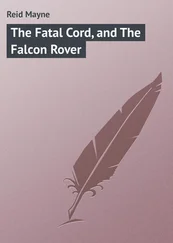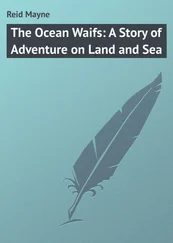Mayne Reid - The Flag of Distress - A Story of the South Sea
Здесь есть возможность читать онлайн «Mayne Reid - The Flag of Distress - A Story of the South Sea» — ознакомительный отрывок электронной книги совершенно бесплатно, а после прочтения отрывка купить полную версию. В некоторых случаях можно слушать аудио, скачать через торрент в формате fb2 и присутствует краткое содержание. Жанр: literature_19, foreign_antique, foreign_prose, foreign_children, на английском языке. Описание произведения, (предисловие) а так же отзывы посетителей доступны на портале библиотеки ЛибКат.
- Название:The Flag of Distress: A Story of the South Sea
- Автор:
- Жанр:
- Год:неизвестен
- ISBN:нет данных
- Рейтинг книги:3 / 5. Голосов: 1
-
Избранное:Добавить в избранное
- Отзывы:
-
Ваша оценка:
- 60
- 1
- 2
- 3
- 4
- 5
The Flag of Distress: A Story of the South Sea: краткое содержание, описание и аннотация
Предлагаем к чтению аннотацию, описание, краткое содержание или предисловие (зависит от того, что написал сам автор книги «The Flag of Distress: A Story of the South Sea»). Если вы не нашли необходимую информацию о книге — напишите в комментариях, мы постараемся отыскать её.
The Flag of Distress: A Story of the South Sea — читать онлайн ознакомительный отрывок
Ниже представлен текст книги, разбитый по страницам. Система сохранения места последней прочитанной страницы, позволяет с удобством читать онлайн бесплатно книгу «The Flag of Distress: A Story of the South Sea», без необходимости каждый раз заново искать на чём Вы остановились. Поставьте закладку, и сможете в любой момент перейти на страницу, на которой закончили чтение.
Интервал:
Закладка:
Mayne Reid
The Flag of Distress: A Story of the South Sea
Chapter One.
A Chase
In mid-ocean – the Pacific. Two ships within sight of one another, less than a league apart. Both sailing before the wind, running dead down it with full canvas spread – not side by side, but one in the wake of the other.
Is it a chase? To all appearance, yes; a probability strengthened by the relative size and character of the vessels. One is a barque, polacca-masted, her masts raking back with the acute shark’s-fin set supposed to be characteristic of piratical craft. The other is a ship, square-rigged and full sized; a row of real, not painted, ports, with a gun grinning out of each, proclaiming her a man-of-war.
She is one – a frigate, as any seaman would say, after giving her a glance. And any landsman might name her nationality. The flag at her peak is one known all over the world: it is the ensign of England.
If it be a chase, she is the pursuer. Her colours might be accepted as surety of this, without regard to the relative position of the vessels; which show the frigate astern, the polacca leading.
The latter also carries a flag – of nationality not so easily determined. Still it is the ensign of a naval power, though one of little note. The five-pointed white star, solitary in a blue field, proclaims it the standard of Chili.
Why should an English frigate be chasing a Chilian barque? There is no war between Great Britain and this, the most prosperous of the South American republics; instead, peace-treaties, with relations of the most amicable kind. Were the polacca showing colours blood-red, or black, with death’s-head and cross-bones, the chase would be intelligible. But the bit of bunting at her masthead has nothing on its field either of menace or defiance. On the contrary, it appeals to pity, and asks for aid; for it is an ensign reversed – in short, a signal of distress .
And yet the craft so signalling is on the scud before a stiff breeze, with all sail set, stays taut, not a rope out of place!
Strange this. So is it considered by every one aboard the man-of-war, from the captain commanding to the latest joined “lubber of a landsman” – a thought that has been in their minds ever since the chase commenced.
For it is a chase: that is, the frigate has sighted a sail, and stood towards it. This without changing course; as, when first espied, the stranger, like herself, was running before the wind. If slowly, the pursuer has, nevertheless, been gradually forging nearer the pursued; till at length the telescope tells the latter to be a barque – at the same time revealing her ensign reversed.
Nothing strange in this, of itself; unfortunately, a sight too common at sea. But that a vessel displaying signals of distress should be carrying all sail, and running away, or attempting to do so, from another making to relieve her – above all, from a ship bearing the British flag – this is strange. And just thus has the polacca been behaving – still is; sailing on down the wind, without slacking haulyards, or lessening her spread of canvas by a single inch!
Certainly the thing seems odd. More than that – mysterious.
To this conclusion have they come on board the warship. And, naturally enough; for there is that which has imbued their thoughts with a tinge of superstition.
In addition to what they see, they have something heard . Within the week they have spoken two vessels, both of which reported this same barque, or one answering her description: “ Polacca-masted, all sail set, ensign reversed .”
A British brig, which the frigate’s boat had boarded, said: That such a craft had run across her bows, so close they could have thrown a rope to her; that at first no one was observed on board; but on her being hailed, two men made appearance, both springing up to the main-shrouds; thence answering the hail in a language altogether unintelligible, and with hoarse croaking voices that resembled the barking of muzzled mastiffs!
It was late twilight, almost night, when this occurred; but the brig’s people could make out the figures of the men, as these clung on to the ratlines. And what seemed as surprising as their odd speech was, that both appeared to be clothed in skin-dresses, covering their bodies from head to foot!
Seeing the signal of distress, the brig’s commander would have sent a boat aboard; but the barque gave no chance for this – keeping on without slacking sail, or showing any other sign of a wish to communicate!
Standing by itself, the tale of the brig’s crew might have been taken for a sailor’s yarn; and as they admitted it to be “almost night,” the obscurity would account for the skin-clothing. But coupled with the report of another vessel, which the frigate had afterwards spoken – a whaler – it seemed to receive full corroboration. The words sent through the whaler’s trumpet were: —
“ Barque sighted, latitude 10 degrees 22 minutes South, longitude 95 degrees West. Polacca-masted. All sail set. Ensign reversed. Chilian. Men seen on board covered with red hair, supposed skin-dresses. Tried to come up, but could not. Barque a fast sailer – went away down wind .”
Already in receipt of such intelligence, it is no wonder that the frigate’s crew feel something more than mere curiosity about a vessel corresponding to the one of which these queer accounts have been given. For they are now near enough the barque to see that she answers the description: “Polacca-masted – all sail set – ensign reversed – Chilian.”
And her behaviour is as reported: sailing away from those who would respond to her appealing signal, to all appearance endeavouring to shun them!
Only now has the chase in reality commenced. Hitherto the frigate was but keeping her own course. But the signal of distress, just sighted through the telescope, has drawn her on; and with canvas crowded, she steers straight for the polacca.
The latter is unquestionably a fast sailer; but although too swift for the brig and whaler, she is no match for the man-of-war. Still she makes quick way, and the chase is likely to be a long one.
As it continues, and the distance does not appear very much, or very rapidly, diminishing, the frigate’s people begin to doubt whether she will ever be overtaken. On the fore-deck the tars stand in groups, mingled with marines, their eyes bent upon the retreating craft, making their comments in muttered tones, many of the men with brows o’ercast. For a fancy has sprung up around the forecastle, that the chased barque is no barque at all, but a phantom ! This is gradually growing into a belief; firmer as they draw nearer, and with naked eye note her correspondence with the reports of the spoken vessels.
They have not yet seen the skin-clad men – if men they be. More like, imagine some, they will prove spectres !
While on the quarterdeck there is no such superstitious thought, a feeling almost as intense agitates the minds of those there assembled. The captain, surrounded by his officers, stands glass in hand gazing at the sail ahead. The frigate, though a fine sailer, is not one of the very fastest, else she might long ago have lapped upon the polacca. Still has she been gradually gaining, and is now less than a league astern.
But the breeze has been also declining, which is against her; and for the last half-hour she has barely preserved her distance from the barque.
To compensate for this, she runs out studding-sails on all her yards, even to the royals; and again makes an effort to bring the chase to a termination. But again to suffer disappointment.
“To no purpose, now,” says her commander, seeing his last sail set. Then adding, as he casts a glance at the sky, sternwards, “The wind’s going down. In ten minutes more we’ll be becalmed.”
Читать дальшеИнтервал:
Закладка:
Похожие книги на «The Flag of Distress: A Story of the South Sea»
Представляем Вашему вниманию похожие книги на «The Flag of Distress: A Story of the South Sea» списком для выбора. Мы отобрали схожую по названию и смыслу литературу в надежде предоставить читателям больше вариантов отыскать новые, интересные, ещё непрочитанные произведения.
Обсуждение, отзывы о книге «The Flag of Distress: A Story of the South Sea» и просто собственные мнения читателей. Оставьте ваши комментарии, напишите, что Вы думаете о произведении, его смысле или главных героях. Укажите что конкретно понравилось, а что нет, и почему Вы так считаете.












